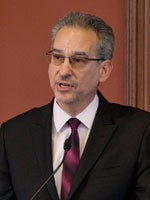A decision by the U.S. Supreme Court on whether Congress has the power to mandate individuals to have private insurance coverage isn’t expected until the end of June. But Georgetown University Law Center professor and libertarian legal theorist Randy Barnett ’77 is already claiming victory of sorts for his argument that the mandate is unconstitutional.
Barnett, who represented the National Federation of Independent Businesses (NFIB) in their challenge to the Patient Protection and Affordable Care Act and attended the oral arguments last month as an observer for that organization, joined HLS Dean Martha L. Minow April 12 to discuss the case in a program sponsored by the HLS Federalist Society.
Minow introduced Barnett as “the person who’s most responsible for bringing public attention to this issue and identifying the structure of a constitutional challenge.”
Barnett characterized his ongoing constitutional challenge to the individual mandate as a rather lonely one when he took it up 2 ½ years ago after lawyer David Rivkin raised the issue in a Wall Street Journal op-ed piece and launched an online legal-blog debate.
“There was another law professor on that blog who posted a very snarky ‘Nobody can be serious about a constitutional challenge here,’” Barnett said. “And I just sort of decided, ‘Well, maybe I should say something.”
Since then, Barnett said, his argument has gained constant momentum, culminating in a historic examination of the issue by the Supreme Court last month. The Justices gave attorneys more than six hours for oral arguments over three days—the most time they’ve allowed for oral arguments since their consideration of Miranda v. Arizona in 1966.
This time, the justices are reviewing Department of Health and Human Services v. Florida, and NFIB v. Sebelius in which the 11th U.S. Circuit Court ruled in January, 2011 that the mandate falls outside the federal authority contemplated by the commerce clause in the Constitution.
One of the central issues examined during the Supreme Court hearings was whether the Anti-Injunction Act, which prohibits taxpayers from challenging a tax until it goes into effect, applies to the health-mandate requirement in the Affordable Care Act.
The argument that the Anti-Injunction does apply—and therefore renders the constitutional challenge moot—is widely held in legal academia, Barnett contended.
“It’s an argument that’s so beloved by professors, but there was not a single justice who was even interested in the tax-power argument in six hours of oral presentation,” he said. “If any justice liked the tax-power theory, you would have expected to hear from her or him during the discussion of the Anti-Injunction Act.”
“The justices were debating among themselves about why it didn’t apply. There was nobody saying it did apply.”
Barnett said he is cautiously optimistic about how the justices will rule. He said he had the sense from the justices at oral arguments that they may believe the Affordable Care Act goes too far.
“If it were actually accepted by the Court, they would basically be saying that Congress has unlimited power to do whatever they want as long as they limit these sanctions to a monetary fine collected by the IRS,” he said. “That would be a startling claim of power.”
“This is a claim of power by Congress that is literally unprecedented. Never before in history has Congress required individual citizens to do business with private companies as a means of exercising its commerce powers.”
He pointed out that just because something is unprecedented, that doesn’t mean it’s necessarily unconstitutional.
What it does do is render it a case of first impression, “which means that it’s highly unlikely that prior precedents have directly addressed the issue of whether this is OK or not. That’s exactly the reason why this has always been a close case on the merits, and not an easy case.”
